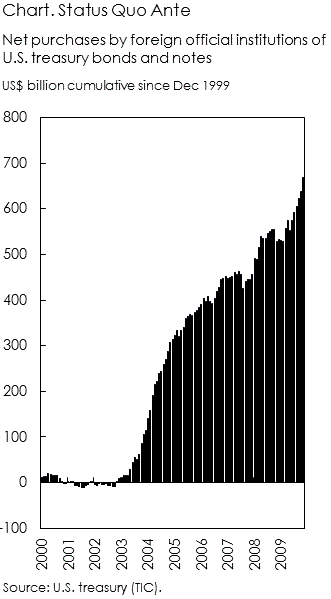"Putting money where the G20's mouth is"
11 November 2009
Ousmène Mandeng, Ashmore Investment Management
The steady depreciation of the dollar has fuelled renewed doubts about the dollar’s status as the dominant reserve currency. Mean- while, central banks have continued to purchase U.S. treasury secu- rities in droves. While they may no longer have full confidence in the dollar as the dominant anchor of the international monetary system, their net purchases appear to signal otherwise (chart). By the same token, the composition of central bank international reserves indicates that central banks do not have any confidence in almost any other currencies. This does not seem consistent with the messages underlying the G20 and the international monetary implications of a global rebalancing. Central banks have the opportunity to signal forcefully that they are supportive of the G20 by “putting their money where the G20’s mouth is” and adopting more diversified currency holdings.
Central banks hold international reserves based predominantly on the criteria of security (should the prevailing interpretation of secu- rity not also be challenged?) and liquidity. Assuming that only a relatively small proportion of international reserves serve immediate foreign exchange intervention, the bulk of reserves are held to pre- serve public wealth. This rests largely on the assertion that as the current crisis, despite being the severest financial crisis for decades, has seen only very limited recourse to international reserves; most countries have levels of international reserves higher than in mid-2008. The high concentration of reserves in dollars and euros thus suggests that central banks do not consider issuers other than U.S. and Eurozone banks and governments as safe which seems to contradict the very meaning of global rebalancing.
The G20 at heads of state level was established in recognition that existing institutions such as the G7 and the IMF are no longer adequate to address the prevailing challenges of the international econ- omy. The G20 rests on the notion that a broader set of countries is more capable to address the fundamental problems of the international economy and overcome the status quo ante. It also suggests a certain confidence that at least most G20 members are important for addressing effectively issues relevant for the international economy. Economic importance does not necessarily mean security but at the margin the relevance of G20 membership must be in doubt if its members do not act in recognition with a new mandate.
The G7 established in 1975 had been considered the premier body for coordinating economic policies, in particular following the Plaza accord of September 1985. The relevance of the G7 rested in large part if not exclusively on the management of major exchange rates. G7 central banks committed to hold or conduct net purchases of each other’s currencies, e.g. during approximately one month following the Plaza accord the U.S. Federal Reserve purchased net US$1.9 billion and US$1.4 billion of German marks and Japanese yen, respectively. The credibility of the G7 was determined largely by the fact that it not only focused on currency misalignments but conducted operations supportive of its views.
